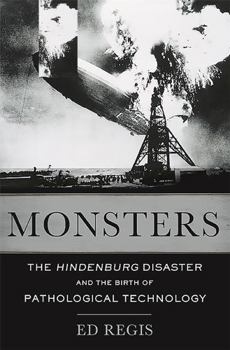Monsters: The Hindenburg Disaster and the Birth of Pathological Technology
Select Format
Select Condition 
Book Overview
"Oh, the humanity " Radio reporter Herbert Morrison's words on witnessing the destruction of the Hindenburg are etched in our collective memory. Yet, while the Hindenburg -- like the Titanic -- is a symbol of the technological hubris of a bygone era, we seem to have forgotten the lessons that can be learned from the infamous 1937 zeppelin disaster. Zeppelins were steerable balloons of highly flammable, explosive gas, but the sheer magic of seeing one of these behemoths afloat in the sky cast an irresistible spell over all those who saw them. In Monsters, Ed Regis explores the question of how a technology now so completely invalidated (and so fundamentally unsafe) ever managed to reach the high-risk level of development that it did. Through the story of the zeppelin's development, Regis examines the perils of what he calls "pathological technologies" -- inventions whose sizeable risks are routinely minimized as a result of their almost mystical allure. Such foolishness is not limited to the industrial age: newer examples of pathological technologies include the US government's planned use of hydrogen bombs for large-scale geoengineering projects; the phenomenally risky, expensive, and ultimately abandoned Superconducting Super Collider; and the exotic interstellar propulsion systems proposed for DARPA's present-day 100 Year Starship project. In case after case, the romantic appeal of foolishly ambitious technologies has blinded us to their shortcomings, dangers, and costs. Both a history of technological folly and a powerful cautionary tale for future technologies and other grandiose schemes, Monsters is essential reading for experts and citizens hoping to see new technologies through clear eyes.
Format:Hardcover
Language:English
ISBN:0465065945
ISBN13:9780465065943
Release Date:September 2015
Publisher:Basic Books
Length:352 Pages
Weight:1.38 lbs.
Dimensions:1.3" x 6.4" x 9.3"
Customer Reviews
0 rating





